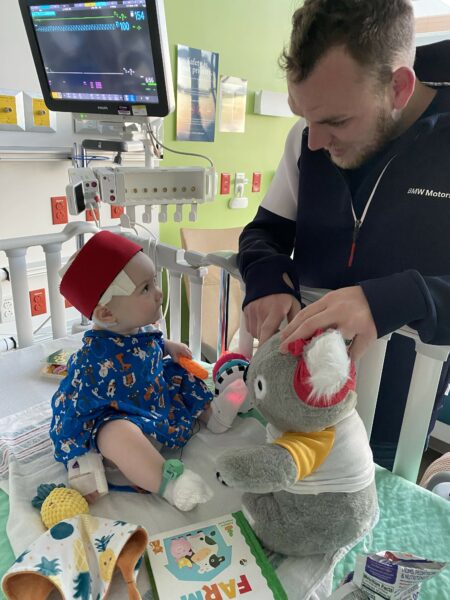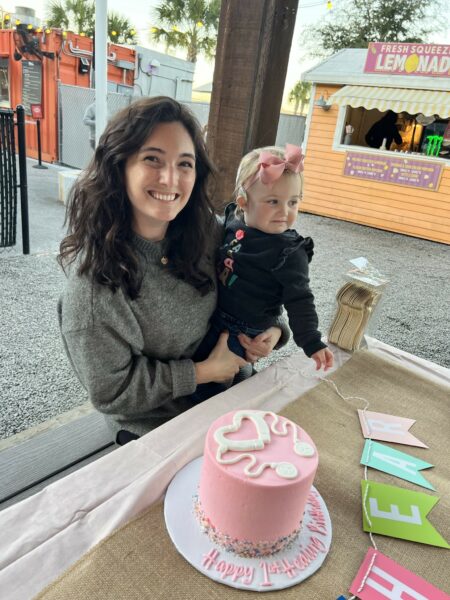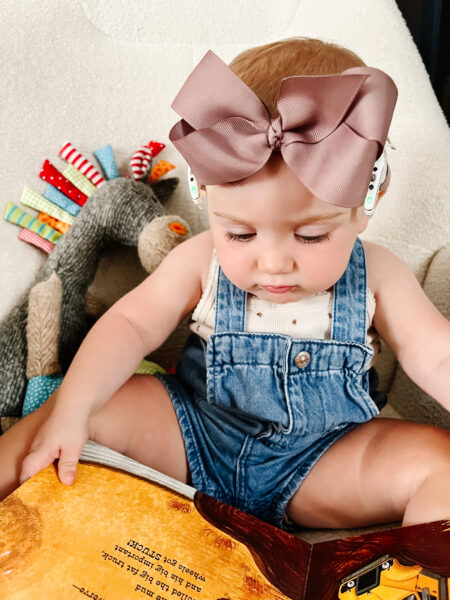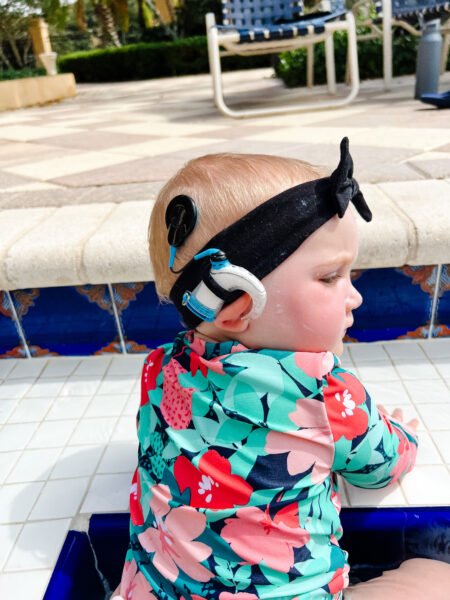In the short time after Ava was born, she was diagnosed with bilateral sensorineural hearing loss from MYO15A. With a healthy pregnancy and no family history of hearing loss, Ava’s parents were speechless. Their audiologist suggested she could be a cochlear implant candidate and they talked with a company representative that forever changed all of their lives. She is now hearing and exceeding everyone’s expectations! Read more:
“Ava was born in January 2021. She is our first daughter and we were in awe of her sweet grunts, funny facial gestures and the excitement of her finally being here! It was less than 8 hours later when the routine hospital screenings started and we met the newborn hearing screening audiologist. I didn’t think anything of the check and used the time to catch up with family and friends who were celebrating Ava’s arrival with us.
After the audiologist was done with the screening she came over to me, handed back our precious bundle and said, ‘I’d like to do another check on her. I think she was squirming too much.’
Let’s try this one more time

 A few hours later, the audiologist was back to run the screening again for Ava. It wasn’t successful. She said, ‘I’d like to try one more time but would you be able to keep Ava up for at least an hour before and then feed her right before I come in? I’ll give you a call when I’m on my way.’
A few hours later, the audiologist was back to run the screening again for Ava. It wasn’t successful. She said, ‘I’d like to try one more time but would you be able to keep Ava up for at least an hour before and then feed her right before I come in? I’ll give you a call when I’m on my way.’
After the third screening, the audiologist came to us with the results. Ava did not pass the hearing screening. ‘That’s OK right now because she could still have fluid in her ears,’ the audiologist told us. ‘I’d like you to do a follow-up Auditory Brainstem Response test (ABR) in one month to make sure everything‘s OK.’As many first-time mothers do, I still had a layer of worry underneath the sleep deprivation and newborn haze.
When Ava was exactly 4 weeks old, we walked into the pediatric hospital for her ABR. I remember being very anxious about it because I hadn’t yet mastered getting Ava to sleep. As a result, it took a few tries to run the test successfully. After about an hour, the audiologist sat down with us, turned on the lights and gave a big sigh.
Ava has a diagnosis, the first in her family
 ‘It’s not good,’ she said. ‘Ava has bilateral profound sensorineural hearing loss. Your daughter is deaf.’
‘It’s not good,’ she said. ‘Ava has bilateral profound sensorineural hearing loss. Your daughter is deaf.’
‘Incurable,’ the audiologist said. ‘She was tested to the limits of the machine, above 100 decibels and there was no response. You can try and see if she is a candidate for cochlear implants but it does not guarantee anything.’
It amazes me how much one can change in one hour. We walked out of that appointment, holding on to a stack of papers that just felt like gibberish to us; speechless, with tears running down our cheeks.
I had a completely normal, uneventful pregnancy.
There was no history of congenital hearing loss within our family.
Ava was the first deaf person we ever met.
We were still getting used to the fact we had a mini human who was awake most of the night when we found out. How could we understand this new world our family was now in? How could we equip ourselves to best navigate and advocate for our precious daughter? How could we prepare her for a life in a sometimes cruel, hard and hearing world? As a first-time mom, I was grieving the loss of a normal first-year experience.
A call that would change our lives
 The next day we received a call from a local representative with Cochlear. She was the first person to ask us how we were handling the diagnoses, what questions we had and how she could help. It was like I was able to come up from under the water and I will forever be thankful.
The next day we received a call from a local representative with Cochlear. She was the first person to ask us how we were handling the diagnoses, what questions we had and how she could help. It was like I was able to come up from under the water and I will forever be thankful.
We entered a season of doctor’s appointments and tests. Through our research, we found that hearing is essential to the development of critical speech, language and communication skills in children. Children with hearing loss are at risk for deficits in cognitive development, psychosocial hardship and educational difficulties. We knew that we wanted to give our daughter the best chance at succeeding and integrating into the hearing world, so cochlear implants weren’t even a question for us. It was just if she was a candidate and when.
We met with an otolaryngologist, fitted Ava with hearing aids and created a plan. We consulted with a genetic counselor and through testing the most common gene mutations that cause hearing loss, we found out that Ava had two mutations for MYO15A, a mutation within the proteins of the cochlear ear hair cells.
While we waited, we had weekly Auditory Verbal Therapy (AVT) that helped guide us and coach us on how to help Ava succeed with the cochlear implants. More importantly, we found pockets of precious time in between appointments where we could be a family of three and savor the little milestones Ava made. This time helped me get to know Ava on such a deeper level – Ava as a deaf person. We developed our own way of communication with smiles and gestures and cuddles. I learned that love is not shown through just words but through actions, physical touch and body language.
The right choice for our family
Before the surgery we had extensively researched the best brand of cochlear options and it became clear: Cochlear was the right choice for our family. From day one, we were thankful for the warmth and knowledge of each staff member. As we learned more, we became aware of the impressive technology and impeccable long-standing reputation that would ensure Ava would be able to use the cochlear implants for the rest of her life without worrying about interruptions or falling behind advances.
At 10 months old, Ava had surgery for bilateral cochlear implants. Five hours later, we greeted our precious girl, her head wrapped in blankets and eyes droopy from the anesthesia. Right next to her was the Kaci, a stuffed Cochlear koala – complete with one cochlear implant attached to his ear. It was something small but I immediately was so happy with our decision to go with Cochlear.
At 11 months old – the day before Christmas Eve – Ava’s cochlear implants were activated. This was the day that we had been waiting, praying and hoping for. The initial reaction was slower than we expected – no reaction. Phew, good. She doesn’t hate them! But then, after the second ear was turned on, our audiologist started to clap her hands. Ava immediately turned her head toward her, giggled and clapped her hands as well!
Ava is now exceeding everyone’s expectations
 Ava has been hearing for almost 6 months and the difference is night and day. She has exceeded everyone’s – her otolaryngologist, audiologist and even our own – expectations and it is humbling. In sound booth tests, she is responding at levels of 20 decibels – just below speech! Before, she did not even respond to 110 decibels.
Ava has been hearing for almost 6 months and the difference is night and day. She has exceeded everyone’s – her otolaryngologist, audiologist and even our own – expectations and it is humbling. In sound booth tests, she is responding at levels of 20 decibels – just below speech! Before, she did not even respond to 110 decibels.
Today, when we wake up, we pop on Ava’s Cochlear™ Kanso® Sound Processors. They’re quick and easy and allow us to quickly get to more important things, like breakfast! Once we get going with our day, we switch to the Cochlear Nucleus® 7 Sound Processors, which stay put no matter what we’re doing, thanks to some adorable cochlear implant headbands. We also appreciate the little things, like the Aqua+1 waterproof option that has allowed Ava to go swimming during our hot Florida days and the drying units to store and care for the devices nightly amidst the humidity.
Ava is a voracious ‘reader,’ babbles all day and loves to bounce to music. We’ve heard her say mama, dada, book, uh oh, more, etc.
The decision to get cochlear implants was an easy one for us, but every day as I put Ava’s cochlear implants on and she lights up, I feel blessed to have access to this technology.”
Here is a link to Ava’s activation video: https://www.facebook.com/Nemours/videos/1082751308966629/
If your child has been diagnosed with bilateral sensorineural hearing loss from MYO15A, a cochlear implant may be able to help. More detailed information here.
2 3- The Nucleus 7 Sound Processor with Aqua+ is water resistant to level IP68 of the International Standard IEC60529. This water protection means that the sound processor with the Aqua+ can be continuously submerged under water to a depth of 3 meters (9 ft and 9 in) for up to 2 hours. This water protection only applies when you use a Cochlear Standard Rechargeable Battery Module or Cochlear Compact Rechargeable Battery Module. The Nucleus 7 Sound Processor is water-resistant to level IP57 of the International Standard IEC60529 without the Aqua+ accessory for the Nucleus 7 Sound Processor. The Kanso 2 Sound Processor is dust and water resistant to level of IP68 of the International Standard IEC60529. The Kanso 2 Sound Processor with Aqua+ is dust and water resistant to level of IP68 of the International Standard IEC60529. This water protection rating means that the sound processor with the Aqua+ can be continuously submerged under water to a depth of up to 3 meters (9 feet and 9 inches) for up to 2 hours. The Aqua+ accessory should be used when participating in prolonged water activities.
- In the United States, the Cochlear Nucleus Implant System is approved for use in children 9 to 24 months of age who have profound sensorineural hearing loss in both ears and demonstrate limited benefit from appropriate hearing aids. Children 2 years of age or older may demonstrate severe to profound hearing loss in both ears.
- In Canada, the Cochlear Nucleus Implant System (CI500 and CI600 Series) is approved for use in children 9 to 24 months of age who have profound sensorineural hearing loss in both ears and demonstrate limited benefit from appropriate hearing aids. Children 2 years of age or older may demonstrate severe to profound hearing loss in both ears.